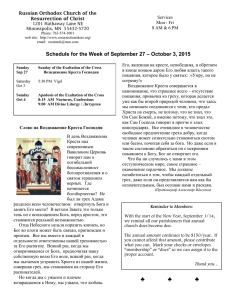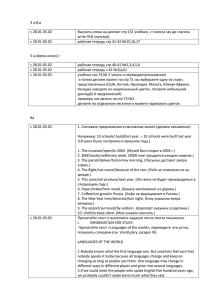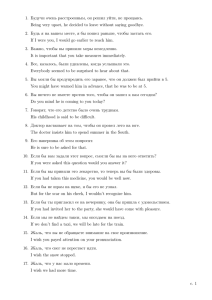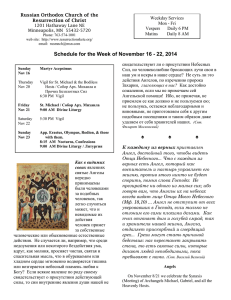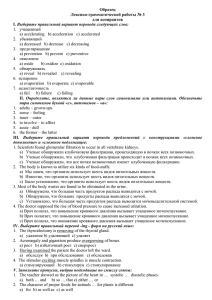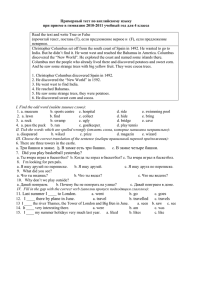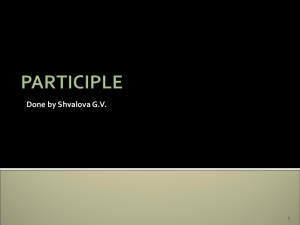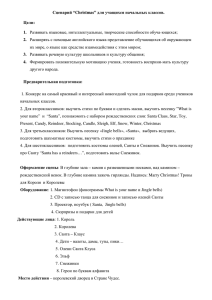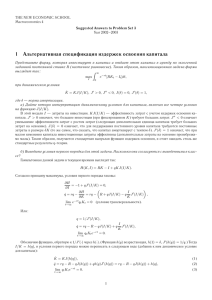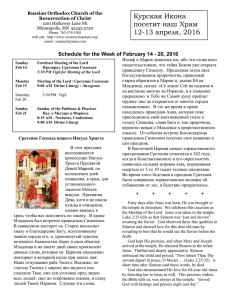Schedule for the Week of August 9 - 15, 2015
реклама
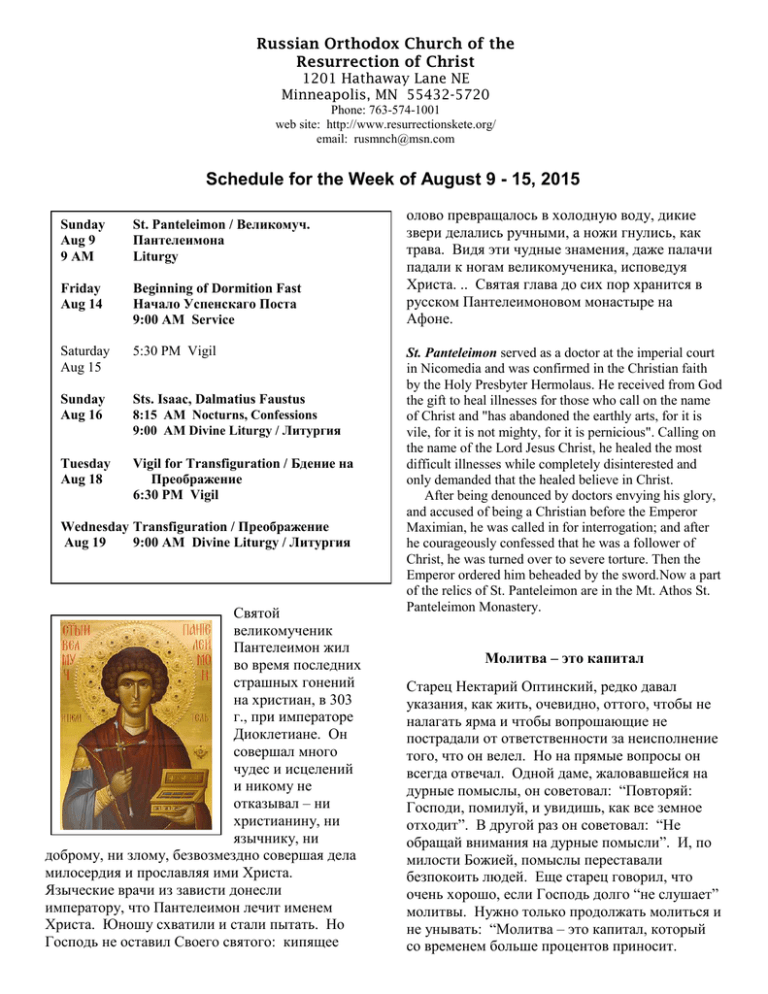
Russian Orthodox Church of the Resurrection of Christ 1201 Hathaway Lane NE Minneapolis, MN 55432-5720 Phone: 763-574-1001 web site: http://www.resurrectionskete.org/ email: [email protected] Schedule for the Week of August 9 - 15, 2015 Sunday Aug 9 9 AM St. Panteleimon / Великомуч. Пантелеимона Liturgy Friday Aug 14 Beginning of Dormition Fast Начало Успенскаго Поста 9:00 AM Service Saturday Aug 15 5:30 PM Vigil Sunday Aug 16 Sts. Isaac, Dalmatius Faustus 8:15 AM Nocturns, Confessions 9:00 AM Divine Liturgy / Литургия Tuesday Aug 18 Vigil for Transfiguration / Бдение на Преображение 6:30 PM Vigil Wednesday Transfiguration / Преображение Aug 19 9:00 AM Divine Liturgy / Литургия Святой великомученик Пантелеимон жил во время последних страшных гонений на христиан, в 303 г., при императоре Диоклетиане. Он совершал много чудес и исцелений и никому не отказывал – ни христианину, ни язычнику, ни доброму, ни злому, безвозмездно совершая дела милосердия и прославляя ими Христа. Языческие врачи из зависти донесли императору, что Пантелеимон лечит именем Христа. Юношу схватили и стали пытать. Но Господь не оставил Своего святого: кипящее олово превращалось в холодную воду, дикие звери делались ручными, а ножи гнулись, как трава. Видя эти чудные знамения, даже палачи падали к ногам великомученика, исповедуя Христа. .. Святая глава до сих пор хранится в русском Пантелеимоновом монастыре на Афоне. St. Panteleimon served as a doctor at the imperial court in Nicomedia and was confirmed in the Christian faith by the Holy Presbyter Hermolaus. He received from God the gift to heal illnesses for those who call on the name of Christ and "has abandoned the earthly arts, for it is vile, for it is not mighty, for it is pernicious". Calling on the name of the Lord Jesus Christ, he healed the most difficult illnesses while completely disinterested and only demanded that the healed believe in Christ. After being denounced by doctors envying his glory, and accused of being a Christian before the Emperor Maximian, he was called in for interrogation; and after he courageously confessed that he was a follower of Christ, he was turned over to severe torture. Then the Emperor ordered him beheaded by the sword.Now a part of the relics of St. Panteleimon are in the Mt. Athos St. Panteleimon Monastery. Молитва – это капитал Старец Нектарий Оптинский, редко давал указания, как жить, очевидно, оттого, чтобы не налагать ярма и чтобы вопрошающие не пострадали от ответственности за неисполнение того, что он велел. Но на прямые вопросы он всегда отвечал. Одной даме, жаловавшейся на дурные помыслы, он советовал: “Повторяй: Господи, помилуй, и увидишь, как все земное отходит”. В другой раз он советовал: “Не обращай внимания на дурные помысли”. И, по милости Божией, помыслы переставали безпокоить людей. Еще старец говорил, что очень хорошо, если Господь долго “не слушает” молитвы. Нужно только продолжать молиться и не унывать: “Молитва – это капитал, который со временем больше процентов приносит. Господь посылает Свою милость тогда, когда это Ему благоугодно; тогда, когда нам полезно принять. Если нам что-либо крайне необходимо, тогда следует два-три раза помолиться, и за исполнение просьбы надо благодарить Бога. Иногда через год Господь исполняет прошение. Пример брать с Иоакима и Анны. Они всю жизнь молились и не унывали, а все надеялись. И какое послал им Господь утешение!”. При всяких неудачах старец велел говорить: “Господи, верю, что терплю должное и получаю то, что я заслужил, но Ты, Господи, по милосердию Твоему прости и помолуй меня...” ♠ ♠ ♠ Passion-Bearer (strastoterptsy) is a special category of Orthodox sainthood, applied to those who, strictly speaking, were not martyrs, because martyrdom requires that the martyr made a choice between rejecting Christ and dying for Him. Passion bearers are instead revered for the humble way in which they met imminent death. For example, Saints Boris and Gleb, Russia’s first saints, were canonized as passion bearers in 1015 because they did not fight their cousins who conspired to kill them over the Kiev throne. Ω Ω Ω The question has been asked, if the Orthodox Church doesn’t refer to the Book of Revelation, why is it included in the Holy Bible? The Orthodox Church accepts the Book of Revelation as a genuine book of the New Testament. The content of this last book of the New Testament is the most dramatic and frightening, and is the most difficult to understand. Practically all of its content deals with the last things to take place: the struggle between the powers of God and the powers of Satan. After Satan is defeated completely by the powers of God, the end of this world will come and the Last Judgement will follow. The Orthodox Church has been extremely careful in trying to interpret the Book of Revelation, a book that is very different from all the other books of the New Testament. The Church’s hesitation in interpreting the book should not be taken as a rejection of it or as indifference to it. However, Orthodoxy has avoided making speculations on a writing that even the author, St. John, did not dare explain. The belief of the Orthodox Church is based on the teachings of the Lord, who spoke of one resurrection of the dead and of one judgement. The church’s teachings have been included in the articles of our Faith, the Creed. Here it is stated: “He (Jesus) shall come again with glory to judge the living and the dead: His Kingdom shall have no end.” And, “I believe in the Resurrection of the dead and the life of the world to come.” As to the views of the Orthodox Church on endof-time warnings, it refers us to the teaching of Jesus as given in Matthew 24:36: “But of that day and hour no one knows, not even the angels of heaven, nor the Son, but the Father only.” We are taught that we should live each day as if it were our last day on earth. We must be prepared for that day, whenever it comes. “You must be ready; for the Son of Man is coming at an hour you do not expect.” (Matt. 24:44). Всегда нужно помнить, что должно не просто только молиться, но молиться так, чтобы быть услышанным. Ибо одна молитва недостаточна для получения желаемого, если мы не будем воссылать ее так, как угодно Богу. И фарисей молился, но не получил пользы, и иудеи молились, но Бог отвратился от молений, потому что молились не так, как должно молиться. Что же нужно? Нужны слезы, рыдания, воздыхания, удаление от людей порочных, страх и опасение суда Божия. Скажу вообще: будем услышаны, если окажемся достойными получить просимое; если молимся согласно законам Божиим о молитве; если молимся непрестанно; если не просим ничего недостойного; если просим полезного; если исполняем должное со своей стороны. Таким образом многие были услышаны: Корнилий был услышан за жизнь.. Соломон – за достойный предмет прошения; мытарь – за смирение... Не услышаны бываем, когда просим бесполезного, также, когда, молясь, не оставляем грехов своих, и еще, когда просим отмщения врагам. (Свят. Иоанн Златоуст)
